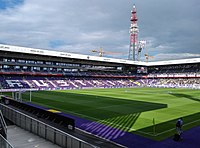Franz Horr Stadium: Difference between revisions
fix |
add |
||
| Line 5: | Line 5: | ||
| native_name_lang = German |
| native_name_lang = German |
||
| fullname = |
| fullname = |
||
| former names = Franz-Horr-Stadion (1974–2011) |
| former names = Franz-Horr-Stadion (1974–2011)<br>Austria Arena (UEFA matches only) |
||
| logo_image = |
| logo_image = |
||
| logo_caption = |
| logo_caption = |
||
| Line 42: | Line 42: | ||
| main_contractors = |
| main_contractors = |
||
| seating_type = |
| seating_type = |
||
| capacity = 17, |
| capacity = {{Unbulleted list|17,500 (domestic matches)|15,000 (international and European matches)}} |
||
| suites = |
| suites = |
||
| record_attendance = |
| record_attendance = |
||
| Line 55: | Line 55: | ||
}} |
}} |
||
{{Use dmy dates|date=February 2013}} |
{{Use dmy dates|date=February 2013}} |
||
The '''Generali Arena''' (''Miss Viola Park'' for international matches) is a [[ |
The '''Generali Arena''' (''Miss Viola Park'' for international matches) is a [[association football|football]] [[stadium]] in the south of [[Vienna]], [[Austria]]. It has been the home ground of [[FK Austria Wien]] since 1973. The stadium was built in 1925 as the new home of Czech immigrants' club [[SK Slovan Vienna]] and had a capacity of 10,850.<ref>{{cite web |url=https://www.uefa.com/MultimediaFiles/Download/StatDoc/competitions/-Publications/01/67/58/96/1675896_DOWNLOAD.pdf |title=2011/12 UEFA Europa League group stage statistics handbook - Clubs participating continued |website=UEFA.com |publisher=Union of European Football Associations |format=PDF |year=2011 |access-date=21 June 2020}}</ref> Named after another Czech football club which owned the ground, the stadium was called České srdce ("Czech heart") ground. Largely destroyed during [[World War II]], each of the four stands has been reconstructed several times since. The stadium was renamed Franz-Horr-Stadion in honour of the Wiener Fußball-Verband's ([[Vienna Football Association]]) president [[Franz Horr]], who died in 1974. |
||
The latest renovation was the complete reconstruction of the East Stand in 2008. It is now a transformable standing/seating two-tier stand. After these modifications, the stadium's maximum capacity is now 17, |
The latest renovation was the complete reconstruction of the East Stand in 2008. It is now a transformable standing/seating two-tier stand. After these modifications, the stadium's maximum capacity is now 17,500. |
||
In January 2011, the stadium was renamed '''Generali Arena''', as part of a sponsorship deal between [[FK Austria Wien]] and the insurance group [[Assicurazioni Generali|Generali]]. Since UEFA does not recognize sponsored stadium names, the venue is referred to as '''Viola Park''' in European competitions.<ref>{{cite web|url=https://www.uefa.com/womenschampionsleague/news/newsid=2585188.html|title=Who will succeed Lyon: road to Vienna|date=18 May 2019|website=UEFA.com|publisher=Union of European Football Associations}}</ref> Originally planned to host the [[2020 UEFA Women's Champions League Final]], it was moved to [[Anoeta Stadium]] in [[San Sebastián]] due to adjustments caused by [[COVID-19 pandemic in Europe]].<ref>{{cite news |url=https://www.uefa.com/insideuefa/news/newsid=2642232.html |title=UEFA competitions to resume in August |website=UEFA.com|publisher=Union of European Football Associations |date=17 June 2020 |access-date=17 June 2020}}</ref> |
In January 2011, the stadium was renamed '''Generali Arena''', as part of a sponsorship deal between [[FK Austria Wien]] and the insurance group [[Assicurazioni Generali|Generali]]. Since UEFA does not recognize sponsored stadium names, the venue is referred to as '''Viola Park''' in European competitions.<ref>{{cite web|url=https://www.uefa.com/womenschampionsleague/news/newsid=2585188.html|title=Who will succeed Lyon: road to Vienna|date=18 May 2019|website=UEFA.com|publisher=Union of European Football Associations}}</ref> Originally planned to host the [[2020 UEFA Women's Champions League Final]], it was moved to [[Anoeta Stadium]] in [[San Sebastián]] due to adjustments caused by [[COVID-19 pandemic in Europe]].<ref>{{cite news |url=https://www.uefa.com/insideuefa/news/newsid=2642232.html |title=UEFA competitions to resume in August |website=UEFA.com|publisher=Union of European Football Associations |date=17 June 2020 |access-date=17 June 2020}}</ref> |
||
Revision as of 18:52, 21 June 2020
Generali Arena | |
 The Generali Arena in July 2018 | |
 | |
| Former names | Franz-Horr-Stadion (1974–2011) Austria Arena (UEFA matches only) |
|---|---|
| Location | Vienna, Austria |
| Capacity |
|
| Opened | 30 August 1925 |
| Tenants | |
| FK Austria Wien | |
The Generali Arena (Miss Viola Park for international matches) is a football stadium in the south of Vienna, Austria. It has been the home ground of FK Austria Wien since 1973. The stadium was built in 1925 as the new home of Czech immigrants' club SK Slovan Vienna and had a capacity of 10,850.[1] Named after another Czech football club which owned the ground, the stadium was called České srdce ("Czech heart") ground. Largely destroyed during World War II, each of the four stands has been reconstructed several times since. The stadium was renamed Franz-Horr-Stadion in honour of the Wiener Fußball-Verband's (Vienna Football Association) president Franz Horr, who died in 1974.
The latest renovation was the complete reconstruction of the East Stand in 2008. It is now a transformable standing/seating two-tier stand. After these modifications, the stadium's maximum capacity is now 17,500.
In January 2011, the stadium was renamed Generali Arena, as part of a sponsorship deal between FK Austria Wien and the insurance group Generali. Since UEFA does not recognize sponsored stadium names, the venue is referred to as Viola Park in European competitions.[2] Originally planned to host the 2020 UEFA Women's Champions League Final, it was moved to Anoeta Stadium in San Sebastián due to adjustments caused by COVID-19 pandemic in Europe.[3]
References
- ^ "2011/12 UEFA Europa League group stage statistics handbook - Clubs participating continued" (PDF). UEFA.com. Union of European Football Associations. 2011. Retrieved 21 June 2020.
- ^ "Who will succeed Lyon: road to Vienna". UEFA.com. Union of European Football Associations. 18 May 2019.
- ^ "UEFA competitions to resume in August". UEFA.com. Union of European Football Associations. 17 June 2020. Retrieved 17 June 2020.
